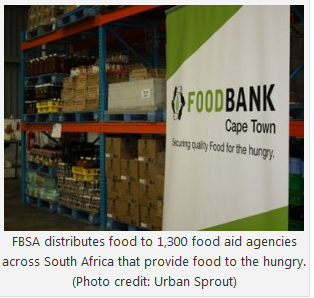 Hunger is pervasive in South Africa, and thousands of domestic and international agencies and not-for-profit organizations are working—separately—to increase the country’s food security. In an effort to address this splintered approach to hunger relief in the country, the organizations Feedback Food Redistribution, Lions Food Project, Robin Good Initiative, and Johannesburg Foodbank agreed to combine their operations. As a result, FoodBank South Africa (FBSA) was born.
Hunger is pervasive in South Africa, and thousands of domestic and international agencies and not-for-profit organizations are working—separately—to increase the country’s food security. In an effort to address this splintered approach to hunger relief in the country, the organizations Feedback Food Redistribution, Lions Food Project, Robin Good Initiative, and Johannesburg Foodbank agreed to combine their operations. As a result, FoodBank South Africa (FBSA) was born.
South Africa has the largest economy in all of Africa and is an agricultural superpower, responsible for 15 percent of sub-Saharan Africa’s agricultural output. Even so, 20 percent of South Africans have insufficient access to food and nearly 30 percent are vulnerable to food insecurity. The problem is lack of access, not insufficient supplies. Every day, huge amounts of available food go to waste.
FBSA is leading a large-scale effort to establish food banks in communities with the highest concentration of food insecure people throughout South Africa. FBSA receives food from government agencies, farms, food manufacturers, food wholesalers, supermarkets, and individuals. The food bank then issues that food to 1,300 food aid agencies nationwide that provide food to the hungry. These agencies include orphanages, daycare centers, centers for the elderly, shelters, soup kitchens, and HIV/AIDS clinics.
To fuel its efforts, FBSA has applied the same spirit of efficiency to spreading information and raising awareness about hunger in South Africa. “Nelson Mandela spent 67 years making the world a better place” FBSA reminds us. “We are asking you for 67 minutes to spend learning about and taking ownership of the problem of hunger in South Africa.” Through its website, willing participants can be guided through a summary of South Africa’s hunger issue and download useful tools for spreading awareness to children, informing your community, and helping to strengthen the network to address hunger.
Fifteen minutes, says FBSA, can be spent browsing the FBSA website focusing on the problem of hunger in South Africa and the world, and how you can be a part of the solution. It takes another 15 minutes to download Hunger Bytes, a set of exercises meant to raise the awareness of food waste among children. Fifteen more minutes could be spent downloading the Placemat for the Hungry, a conversation piece aimed at engaging friends and the community and encouraging them to get involved in food bank efforts. Officially supporting the Help FoodBank SA end hunger in South Africa cause on Facebook takes another 15 minutes. Finally, FBSA encourages people to take 7 minutes to make a donation to their organization.
By making it easier for South Africans to donate surplus food, safely and efficiently distribute that food to those who need it most, and raise awareness in their community, FBSA is helping the country realize its potential to overcome the challenges that remain in the post-apartheid era. “Like slavery and apartheid,” states a quote from Nelson Mandela on FBSA’s website, “poverty is not natural. It is man-made and it can be overcome and eradicated by the actions of human beings.”
By Matt Styslinger

Danielle Nierenberg, an expert on livestock and sustainability, currently serves as Project Director of State of World 2011 for the Worldwatch Institute, a Washington, DC-based environmental think tank. Her knowledge of factory farming and its global spread and sustainable agriculture has been cited widely in the New York Times Magazine, the International Herald Tribune, the Washington Post, and
other publications.
Danielle worked for two years as a Peace Corps volunteer in the Dominican Republic. She is currently traveling across Africa looking at innovations that are working to alleviate hunger and poverty and blogging everyday at Worldwatch Institute’s Nourishing the Planet. She has a regular column with the Mail & Guardian, the Kansas City Star, and the Huffington Post and her writing was been featured in newspapers across Africa including the Cape Town Argus, the Zambia Daily Mail, Coast Week (Kenya), and other African publications. She holds an M.S. in agriculture, food, and environment from Tufts University and a B.A. in environmental policy from Monmouth College.








